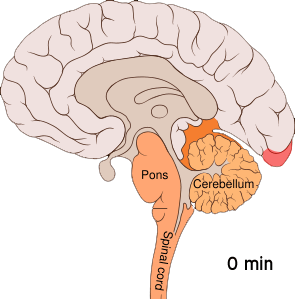1. The illness(es) I live with are: Chronic Fatigue Syndrome, Undifferentiated Connective Tissue Disease, Functional Movement Disorder, Sleep Apnea,
Delayed Sleep Phase Disorder, Migraine,
Mitral Valve Prolapse, Depression, Hashimoto's Thyroiditis
2. I was diagnosed with it in the year: Heh - a lot of the diagnoses came in 2008/9; some like the MVP well before that
3. But I had symptoms since: my mid-to-late teens, so about 15 years
4. The biggest adjustment I’ve had to make is: No longer being able to bounce back from illness or overwork or push past exhaustion or pain
5. Most people assume: That I'm "just tired," or that I only became ill very recently and don't realize I was coping with symptoms increasing in number and frequency over a long period of time.
6. The hardest part about mornings are: Getting going and trying to figure out how much energy I'll have for the day and how best to use it.
7. My favorite medical TV show is: MASH
8. A gadget I couldn’t live without is: My cane. Seriously, my cane means freedom and independence for me even on the days when my depth perception is shot and I have vertigo or my legs don't seem to want to function properly.
9. The hardest part about nights are: Getting to sleep, especially when I'm in too much pain to ignore it.
10. Each day I take __ pills daily (No comments, please) 9, assuming I don't take any "as needed" meds for pain or allergies, like Aleve, ibuprofen, Klonopin, Benadryl, etc. It's usually more than 9.
11. Regarding alternative treatments I: I do careful research and look for clinical studies and other information about certain treatments, in particular herbs and supplements, make sure there isn't a risk of interaction with any existing meds or illness, check with the appropriate doctor, and give it a try. My basic philosophy is that if it isn't hurting you in some way or interfering with evidence-based medical treatment and it makes you feel better, that's all to the good.
12. If I had to choose between an invisible illness or visible I would choose: I don't think I can make that choice.
13. Regarding working and career: I chose to give up my career as an Egyptologist because I simply couldn't manage finishing my PhD and then go on to try for a faculty position or do field work in my current condition and because I didn't think I could find an adequate balance of stress and health. But I have found ways to keep busy. I'm working part-time in a relatively low-stress position. I'm also slowly working on developing a home-based craft business. My entire perspective has shifted from living to work to working to live (cliched though that may sound).
14. People would be surprised to know: I think it depends on the person and how they
think they know me. Some people would be surprised to know that I've accepted the reality of my illness and am, for the most part happy in spite of it all. Other people would be surprised to know that there are days when I sob over not being able to lift a milk jug because it reminds me of all I can't or find hard to do. Anyone who really knows me though, probably wouldn't be surprised at all to know that after the sobbing, I pull myself together and figure out a way to get the milk I wanted and then laugh at myself for getting all emo.
I doubt many people know or guessed that there were days when I felt so alone, so agonized, so guilty, so much a burden, and so hopeless that I wanted to die, because that would somehow be easier for me and everyone around me.
I don't know how many people know that when we were waiting for my
Huntington's Disease test to come back (it was negative) my first thought was how horrible it would be for my husband to watch me decline and die and my second thought was wondering, if the test came back positive, what that would mean for my parents, half-brothers, and nephews and niece.
I don't know if anyone knows that there are days when I feel like a lazy, melodramatic, wimpy fraud.
15. The hardest thing to accept about my new reality has been: I have limits and I cannot predict how I'll feel from day to day. That some people just will not believe me or come even close to understanding what my life is like now.
16. Something I never thought I could do with my illness that I did was: Go out by myself further than just to doctor's appointments
17. The commercials about my illness: There are commercials? I don't have regular TV anymore - have they finally opened Cripples R Us?
18. Something I really miss doing since I was diagnosed is: Running, riding a bike, driving, digging
19. It was really hard to have to give up: Driving, but I don't feel safe and I can't bring myself to put other people at risk if my attention wanders or I have a weird muscle spasm or my depth perception is totally off.
20. A new hobby I have taken up since my diagnosis is: Crochet, Knitting, Sewing, Polymer Clay
21. If I could have one day of feeling normal again I would: Dance
22. My illness has taught me: Patience, the value of friendship, the value of family, ingenuity
23. Want to know a secret? One thing people say that gets under my skin is: I can't limit this to just one. "Oh, yeah, I'm tired too. We're all tired." And "You should get out more." And "It's all in your head." And "If you'd just try harder." And "But you're so young." And "But you don't look sick/in pain/tired." And "Have they figured out what's wrong (and fixed it) yet?"
24. But I love it when people: Ask if I need help, anticipate that I may not be able to handle certain things, genuinely try to understand what my life and illness are like now.
25. My favorite motto, scripture, quote that gets me through tough times is: You're never given a burden heavier than you can carry, no matter how much it may seem otherwise.
26. When someone is diagnosed I’d like to tell them: What you feel is real, your health is real, and your needs are real. Don't let anyone tell you otherwise. Learn to set limits and remember that because so many of your symptoms are invisible, you have to tell people how you feel. They aren't mind-readers. It will help you and the people around you adapt so much faster is they really know what's going on. Telling people "I'm in pain" or "I don't think I can do that" is not the same as complaining. It's being proactive.
Also, give serious consideration to exploring mental health counseling or therapy. The right therapist and program can help immensely with coming to terms with your health, coping with feelings of grief and guilt, and learning how to relate to the people around you. It doesn't mean you're "crazy" or that your illness is "all in your head" - it means that you're taking all the measures you can to keep yourself as healthy as possible and to learn as many coping skills as possible.
27. Something that has surprised me about living with an illness is: How quickly I've learned to cope.
28. The nicest thing someone did for me when I wasn’t feeling well was: Being there and supportive and undemanding
29. I’m involved with Invisible Illness Week because: I think it's important to add my voice and my experience to increase awareness of "invisible" illnesses - their existence and the experience of living them.
30. The fact that you read this list makes me feel: Grateful.










![injections [616]](http://farm5.static.flickr.com/4108/4973474372_87219749dc_m.jpg)

















